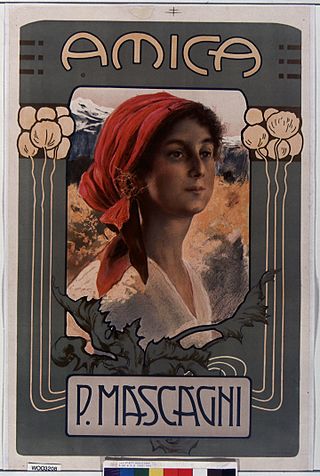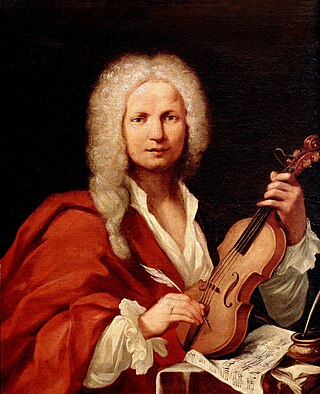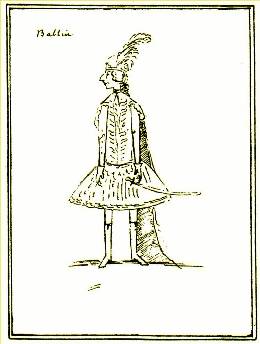
La leggenda di Sakùntala is a three-act opera by Franco Alfano, who wrote his own libretto, basing his work on Kālidāsa's 5th-century BC drama Shakuntala.
Telemaco, ossia L'isola di Circe is an operatic dramma per musica in two acts by Christoph Willibald Gluck. The Italian libretto was written by Marco Coltellini after Carlo Sigismondo Capece's libretto for Scarlatti's 1718 opera Telemaco.

Amica is an opera in two acts by Pietro Mascagni, originally composed to a libretto by Paul Bérel. The only opera by Mascagni with a French libretto, it was an immediate success with both the audience and the critics on its opening night at the Théâtre du Casino in Monte-Carlo on 16 March 1905. Mascagni himself conducted the performance. The opera had its Italian premiere on 13 May 1905 at the Teatro Costanzi in Rome.

Didon (Dido) is a tragédie lyrique in three acts by the composer Niccolò Piccinni with a French-language libretto by Jean-François Marmontel. The opera is based on the story of Dido and Aeneas from Virgil's Aeneid as well as Metastasio's libretto Didone abbandonata. Didon was first performed at Fontainebleau on 16 October 1783 in the presence of the French sovereigns, Louis XVI and Marie Antoinette. After being remounted at court twice, the opera had its Paris public premiere on 1 December 1783. It proved to be the composer's greatest success and was billed almost every year till 1826, enjoying a total of 250 performances al the Paris Opera. Didon had some influence on Berlioz's opera on the same theme, Les Troyens.

L'incoronazione di Dario is a dramma per musica by Antonio Vivaldi with an Italian libretto by Adriano Morselli. The opera was first performed at the Teatro Sant'Angelo in Venice on 23 January 1717.
Giulietta e Romeo is a dramma per musica by composer Niccolò Antonio Zingarelli with an Italian libretto by Giuseppe Maria Foppa after the 1530 novella of the same name by Luigi da Porto. The opera premiered at the Teatro alla Scala in Milan on 30 January 1796.
Gennaro Astarita was an Italian composer, mainly of operas. The place of his birth is unknown, although he was active in Naples for many years. He began his operatic career in 1765, collaborating with Niccolò Piccinni in the writing of the opera L'orfana insidiata. He became the maestro di cappella in Naples in 1770.

Medea is an opera in three acts composed by Giovanni Pacini to a libretto by Benedetto Castiglia. It premiered on 28 November 1843 at the Teatro Carolino in Palermo, conducted by the composer with Geltrude Bortolotti in the title role. The libretto is based on the plays Medea by Euripides and Médée by Pierre Corneille.
Ginevra di Scozia is an opera in two acts by Simon Mayr set to an Italian libretto by Gaetano Rossi based on Antonio Salvi's Ginevra, principessa di Scozia, which in turn was adapted from cantos 5 and 6 of Ludovico Ariosto's Orlando Furioso. Ginevra di Scozia premiered on 21 April 1801 at the Regio Teatro Nuovo in Trieste to celebrate the inauguration of the new theatre. The story is virtually identical to that of Handel's Ariodante which shares the same source for the libretto.

Didone abbandonata was an opera in three acts composed by Tomaso Albinoni. Albinoni's music was set to Pietro Metastasio's libretto, Didone abbandonata, which was in turn based on the story of Dido and Aeneas from the fourth book of Virgil's Aeneid. The opera premiered on 26 December 1724 at the Teatro San Cassiano in Venice and was the first time that an opera based on a Metastasio libretto was performed in Venice.

Dido, Queen of Carthage was an opera in three acts by Stephen Storace. Its English libretto by Prince Hoare was adapted from Metastasio's 1724 libretto, Didone abbandonata, which had been set by many composers. Storace's opera premiered on 23 May 1792 at The King's Theatre in London combined with a performance of his masque, Neptune's Prophecy. The story is based on that of Dido and Aeneas in the fourth book of Virgil's Aeneid. The opera was not a success and was never revived after its original run of performances. The score has been lost.

Didone abbandonata is an opera in three acts composed by Domenico Sarro to a libretto by Pietro Metastasio of the same name which was based on the story of Dido and Aeneas from the fourth book of Virgil's Aeneid. The opera premiered on 1 February 1724 at the Teatro San Bartolomeo in Naples.

Annibale Pio Fabri, also known as Balino, from Annibalino, diminutive of his first name, was an Italian singer and composer of the 18th century. One of the leading tenors of his age in a time dominated by the castrati, Fabri is now best known for his association with the composer George Frideric Handel, in whose operas Fabri sang.
Marietta Sacchi was an Italian operatic soprano who had an active career during the 1820s and 1830s.
Nitocri is an opera in two acts composed by Saverio Mercadante to libretto by Apostolo Zeno adapted by Lodovico Piossasco Feys. The libretto is a fictionalised account of the Egyptian queen Nitocris. The opera premiered at the Teatro Regio in Turin on 26 December 1824.

Caterina Canzi, also known as Katharina Wallbach-Canzi, was an Austrian-born soprano who sang leading roles in the opera houses of Europe, primarily in Italy and Germany. Amongst the roles she created were Isolde in Lindpaintner's Der Vampyr and the title role in Mercadante's Nitocri.

Fanny Eckerlin (1802–1842) was an Italian mezzo-soprano who also sang contralto roles. During her career she was highly regarded, drawing favorable comparisons to Benedetta Rosmunda Pisaroni, but today she is remembered, if at all, for her association with the early career of Gaetano Donizetti, including creating the title role in his first publicly-performed opera, Enrico di Borgogna.
Didone abbandonata is a setting by Leonardo Vinci of the libretto Didone abbandonata by Metastasio first set to music by Domenico Sarro in 1724. It was premiered at the Teatro delle Dame for the 1726 Carnival season in Rome.
Didone abbandonata is an opera in three acts by Niccolò Jommelli of the libretto Didone abbandonata by Pietro Metastasio. It was composed just after Jommelli left Venice in 1746 and revised in 1763. It was first performed on January 28, 1747, at the Teatro Argentina in Rome.










